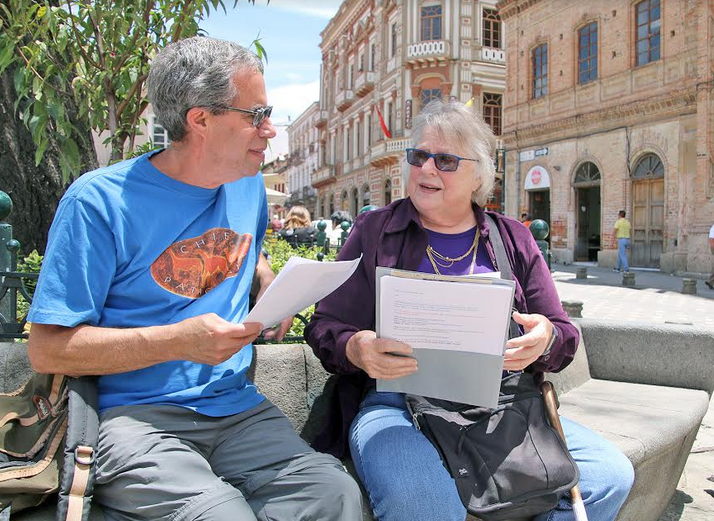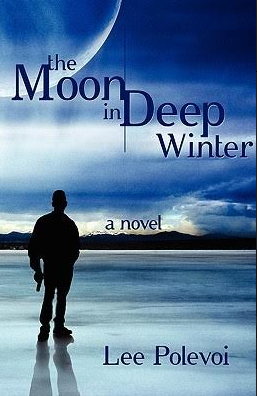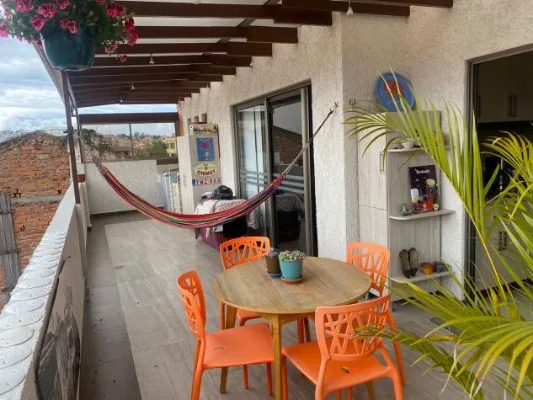What drives us to write

Expat writers Lee Polevoi and Jean McCord discuss the finer points their recent work. (Photo by John Keeble)
Editor’s note: Writers on Writers in an on-going series in which Cuenca expat writers interview each other about their their work. Here, Lee Polevoi and Jean McCord talk about why they write and what they write.
Writers’ Q&A (Part 1): Jean McCord asks Lee Polevoi about his writing
Lee, what are you working on now?
I’m writing a novel set in Cuenca about a young American on the run from “bad people” in the U.S. I hope to use the dramatic format of a thriller to convey the strangeness initially felt by many expats, but particularly by one individual who’s under a great deal of pressure. Things become even more urgent when the American expat comes to believe that the bad guys have tracked him down and intend to deal with him in a definitive manner.
What kind of writing have you done before?
My novel, The Moon in Deep Winter, was published in 2008 (available on Kindle). It’s about a young man who returns to his family home in the woods of New England and discovers members of his family are plotting to murder each other. (I should add the novel is not autobiographical; my family is loving, well-liked and entirely law-abiding.)
It’s exciting that a director and actor in New York are in the early stages of making a film of The Moon in Deep Winter. They’ve put together financing to shoot a couple of dramatic scenes, which they will in turn use to attract large-scale investors. Putting together an independent film is a complicated, sometimes tortuous process, as I’m learning. It’s fortunate that these young filmmakers have a passion for the material and are willing to work hard to get the movie made.
Speaking of movies, I’ve done a stint in Hollywood, too. As a recipient of a $20,000 screenwriting fellowship in the early 1990s, I studied the craft of screenwriting at Amblin Entertainment/Universal Pictures. Eventually I was hired to write a screenplay based on a Joseph Conrad novel for the director Frasier Heston.
More recently, I’ve completed a new novel, The Confessions of Gabriel Ash, a Cold War thriller set in New York and eastern Europe during the early 1980s. It seems particularly timely now, given all the global tensions between the US and the former Soviet Union.
I also regularly review books for an online publication called Highbrow.
Why is writing in Cuenca so important to you?
It’s important in learning how to write about a locale completely different than what I’ve known in the U.S. One challenge is learning how to incorporate details of Cuencano life and bits of Spanish (which is muy difficile to learn!), without overwhelming a reader with too much local color. At the same time, of course, it’s important to keep readers turning pages.
What drives you as a writer?
Language, when well-rendered and graced with an ear-pleasing rhythm, is one of the great joys of life. The achievements of great novels and wishing to emulate them to the fullest extent of my ability drive me as a writer. I make no claims on creating great literature, only the desire to do the best I can to put interesting words and stories on the page.
Where do your characters come from?
For me, a story or novel starts with a character in some type of dilemma. All good fiction puts pressure on the main character, turning the screws on him or her until something threatens to break. Characters forced to make decisions and take actions are the most interesting to read about. Putting a protagonist in an unfamiliar setting – which, let’s face it, is what most Americans find when they first arrive in Ecuador – just adds to the pressure, and hopefully generates more tension for the reader to enjoy.
What writers have influenced you the most?
It’s a long list, but at the top are the late Robert Stone and a great novelist/short story writer named Thomas McGuane. Plenty of others have been very influential, from Alice Munro and John Banville to Don DeLillo and John LeCarre. For me, the best fiction starts at the sentence level. Good writing that’s vivid and insightful, while also drawing a reader into a new and different world, is what I find the most compelling.
How can people find your work?
The Moon in Deep Winter is available on Amazon, in print and e-book formats. “Death Threat,” a brief excerpt from my newly completed novel, can be read on Highbrow magazine’s site.
More reviews of books can be found on ForeWord, which covers the independent book publishing industry.
I’m also working as a freelance business writer, with clients throughout the U.S. You can learn more about my work at Polevoi Communications.
Q&A (Part 2): Lee Polevoi asks Jean McCord about her writing
Jean, what are you mainly writing now?
I’m working on the second of two stand-alone books set in the Pacific Northwest. Both feature freelance writer Sarah Tierney, her two dogs, and recently retired sheriff’s detective Harold Workman.
In The Eagle Murders, Sarah encounters the body of a young girl on a sandbar during an eagle-watching raft trip on the Skagit River. Detectives hope information from this latest murder will help break a serial killer case. After others are attacked, Sarah, back at her home in Tacoma, is the next likely victim.
 Death of a Sea Otter picks up three months later as Sarah deals with fame resulting from the aftermath of the serial killer case, as well as a budding relationship between her and Harold. Drugs, sex (or the lack thereof), shady fundraising practices, and the death of a college student take center stage.
Death of a Sea Otter picks up three months later as Sarah deals with fame resulting from the aftermath of the serial killer case, as well as a budding relationship between her and Harold. Drugs, sex (or the lack thereof), shady fundraising practices, and the death of a college student take center stage.
What drives you as a writer?
I write mysteries because I enjoy reading them. Good ones, where the characters and action are believable, both provide entertainment and engage the reader’s mind. I take this seriously, so to understand better what goes into solving crimes, I observed on-duty police officers as a journalist and later became a commissioned reserve deputy sheriff.
However, my interest in writing began much earlier, when I started reading at age four. I sold my first story at age 13. In high school, I talked my way into an interview with Metropolitan Opera singer Jerome Hines and my local newspaper asked to write a weekly column. In college, I dreamed of writing the next Great American Novel and received a summer grant to write my first novel. After putting fiction writing aside for too many years, I’m making up for lost time.
A good book draws me in, intrigues me, and keeps drawing me back to know the characters better and to find out what happens next. I want my readers to keep reading as well, not only to find out who dunnit or why he or she dunnit, but also because they care about the characters. Even though I write about murder (which I hope is not part of their lives), I want my readers to feel a connection to the characters and situations and to feel satisfied when they’ve turned the last page.
What kind of writing have you done before? What have you previously published?
My short story, “Early Morning Rain,” won the Derringer Award from the Short Mystery Fiction Society as the best longer short mystery published that year, in competition with such well-known writers as Jeffery Deaver. I also wrote numerous articles for professional publications before I retired. In addition, my series “Along for the Ride,” about observing eighteen different police, fire, and ambulance officers at work,ran in two newspapers over a couple of years. Other newspaper pieces include feature articles and cover stories on the Tacoma Citizen’s Police Academy, demolition of what was once the tallest smokestack west of the Mississippi, an interview with television host John Walsh of America’s Most Wanted, and other personal profiles. Because I had a press pass, I could go places I could never have entered as a “civilian.”
Why is writing in Cuenca so important to you?
Cuenca and its creative arts scene brought my writing career back to life. I had started working on The Eagle Murders many years ago, but didn’t finishit until 2015, when I joined the Cuenca Writers Collective(CWC) critique group during my scouting visit. That experience gave me the courage to enterEagle in the 2016 international Pacific Northwest Writers’ Contest, where it won second place in the mystery/thriller genre. One reviewer wrote, “[This manuscript is] polished and assured . . . [the pacing is] pretty much perfect.” Another wrote, “Very clean descriptions, a clear sense of language, lyrical without straining for metaphors.”Kudos and awards aren’t what motivate me to write, but prizes and such comments have helped me get over the fear that I have nothing worth offering. Living in Cuenca now gives me time to work on the second mystery, and CWC continues to help me develop as a writer.
Where do your characters come from?
I’ve been tempted to model my villains after some people I’ve known, but I’ve resisted. All characters are composites, with physical peculiarities, ways of speaking, and bits of personal history taken from many different people.
How much of you is in your books?
I love books that convey a sense of place, so locales come directly from my own experiences in the Pacific Northwest. The only corpses seen on my rafting trip were those of spawned-out salmon, but I’ll never forget the many eagles and the sights around each bend in the river. I’m not Sarah, but her house is where I lived for thirty-six years, and my administrative position at a local university gave me insight into her former job. My dogs, Jesse and Golda, died long ago, but used to walk Puget Sound beaches with me and live on as Sarah’s companions. Using real locations is easy; the hard part is remembering how things were in late 1989 and early 1990, when my books are set.
What writers influenced you the most?
Although I think it’s crucial to read widely and deeply in one’s own genre, many of my favorite authors, such as Elizabeth Goudge, Madeline L’Engle, Stephanie Kallos, and Zenna Henderson, aren’t mystery writers. However, they create memorable characters and tell great stories, and I aim to do the same. I favor character-driven books to ones driven by plot, often prefer women writers, and choose mysteries over thrillers.
How can I read any of your work?
Link to http://www.drunkentelegraph.com/2014/04/14/jean-mccord-all-alone-on-a-manhunt/to hear me relate one adventure when I was a reserve deputy sheriff. CuencaHighLife published a slightly different version as, “Fifty, female, and armed but will she pull the trigger?”at: https://cuencahighldev.wpengine.com/fifty-female-and-armed/as well as,“How the police took me away to El Cajas park” at: https://cuencahighldev.wpengine.com/how-the-police-took-me-away-to-el-cajas-park/
I plan to publish the two mystery novels as e-books as soon as I finish Death of a SeaOtter. Until then, I’ll keep writing and revising.
















